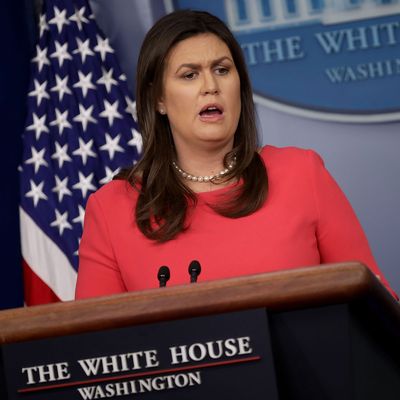
It’s the end of the week in Washington, and there are some things that we know to be true: It’s 83 degrees and partly cloudy, with 47 percent humidity. At 11:30 a.m., Donald Trump’s day officially started with an intelligence briefing in the Oval Office. According to his schedule, he will do nothing until the late afternoon, when he’ll board Marine One on the South Lawn to be ferried the ten minutes to Joint Base Andrews. At 5:00 p.m., he’ll arrive in Bedminster, New Jersey.
Yet the reality of nearly everything else that happened before our eyes this week — or did it? — is the subject of debate for the White House.
“The White House” being separate from “the president” in this administration as they’ve never been separate before, with contradictory statements emerging at a machine-gun pace from these two entities that are supposed to be in sync, if nothing else at least spinning the story (i.e. bullshitting) in the same way. Often the White House is cleaning up after Trump, but just as often those attempts to clarify or explain away are what one former official told me was wishful thinking, what his staff wishes the president would say or believe or make policy.
Over the last five days, the White House has attempted to manufacture a permanent state of uncertainty, in which when Trump says or does anything — even with the world as witness — we can be talked into believing the most harmless interpretation of the facts.
It began on Monday in Helsinki, Finland, when the president stood beside Vladimir Putin and, contradicting his own intelligence agencies, said he didn’t see why Russia would have meddled in the election that made him president. “I have President Putin; he just said it’s not Russia,” Trump said. “I don’t see any reason why it would be.”
But back in the distortion field of Washington the next day, while addressing the media before a meeting in the Cabinet Room, he claimed he’d meant to say the opposite of what he said. “I thought I made myself very clear,” he said. “I came back, and I said, ‘What is going on? What’s the big deal?’” He continued, “The sentence should have been, ‘I don’t see any reason why it wouldn’t be Russia.’ Sort of a double negative.”
A few days later, the White House said that another statement from Trump in Helsinki was not what it seemed. At the summit, Putin suggested that the two countries do an exchange: the U.S. would have permission to interrogate the 12 Russian intelligence officers indicted by special counsel Robert Mueller for interference in the election if the the Kremlin could interrogate U.S. citizens for reasons unknown. Trump said this was an “incredible offer.” But that’s not what he meant, according to the White House. “It is a proposal that was made in sincerity by President Putin, but President Trump disagrees with it,” Press Secretary Sarah Huckabee Sanders said.
One former White House official told me that silly and perplexing explanations from Trumpland seemed purposefully so. “I think there’s genuinely a chance that part of the strategy on this is to sow confusion,” this person said.
“You and I are having this conversation right now, and we follow this stuff every day, and we can’t fully make sense of this. Imagine if you are John Q. Public who casually follows this stuff and catches it on the evening news or whatever, at some point you just throw your hands up and say, ‘I don’t know what’s going on!’”
“That’s one of the main reasons why there’s never been a story that actually did lasting damage to him. You can point to a handful of stories over the last couple of years that lasted more than a couple of days. I was on the campaign and I was in the White House and I follow it even now, and I don’t understand some of the Russia stuff.”
The former White House official was reluctant to blame Trump’s handlers or communications staff for the would/wouldn’t “double negative” excuse, which a second former White House official described to me as “one of the all-time great” messaging mistakes in American politics. It’s important to keep in mind, the first person said, that there’s only so much any member of the staff can do, especially when it comes to how Trump talks about Russia.
“At the most fundamental level, the reason why the president struggles so much with this in general is he cannot separate the accusations against him of collusion from the fact that Russia meddled in the election, and he feels like if he were to give an inch on meddling, they’re gonna take a mile on collusion.”
This person added, “Having been in dozens of prep sessions with the president for various interviews or events or whatever it may be, I hesitate to throw the staff under the table, because I know he’s just gonna do whatever he’s gonna do. He will listen or take feedback, but once he gets out there, he’s just gonna say what he’s gonna say.”
“He’s just on an island a little bit. On this issue maybe more than any other, he’s gonna talk about it the way he wants to talk about it.”
The second former official said it was important to remember that “something always goes wrong” with Trump. “There’s always some issue in the White House when it comes to responding to a crisis, and 90 percent of the time, it’s crises that they create themselves, and you have to go in with the understanding that the baseline level for these guys is full retard, basically.”
“When that was their excuse, I couldn’t stop laughing. It’s so ridiculous.”
“The one thing that makes this week so much different is they’re actually trying to fight back. Typically, Trump would say something completely insane and they would just let the media cycle sit. At least they’re trying to fight back. They’re fighting back in the worst possible way, but like, you can see the effort. You know these guys are fucking idiots, but the effort is there.”
The second former official added, “You have a lot of people who are just a bunch of small-timers and clowns, so when they fuck up a response, you almost can’t blame them because you knew what you were getting, you know? When you have people who suck at this and then they fuck up a response, you can’t really be angry. This is what you have. It’s like having a puppy that shits on the floor, you can’t get angry at the puppy. The puppy doesn’t know any better.”
“I guess it’s like the puppy shat on the floor, and then they took the shit and they rubbed it all over the walls.”
The Cabinet Room, where Trump was attempting to clear up one disaster, became the scene of a second disaster — or, really, a third disaster, if you count the cleanup of Disaster One as Disaster Two. While taking questions from reporters, he was asked by ABC’s Cecilia Vega if he believed Russia was still targeting the U.S. “No,” he said, placing his opinion in direct conflict with his own intelligence agencies again.
Vega confirmed the president’s answer by asking the question again. “No? You don’t believe that to be the case?” she asked. “No,” he said.
A few hours later, during the White House briefing, the press secretary said Trump had not, in fact, said that he doesn’t think Russia continues to target the U.S. According to Sarah Huckabee Sanders, Trump was actually saying “no” to answering more questions from the press. (After responding to Vega, Trump continued to answer questions from the press.) On Twitter, Vega said the president “was looking directly at me when he spoke” and she believed “he heard me clearly.”
Although it was a disaster scene, the scene in the Cabinet Room rendered the week’s first disaster scene in Helsinki old news, at least in terms of imagery. This, the first former White House official said, was intentional, and to the credit of Bill Shine, the former president of Fox News who recently joined the White House communications team. “My understanding is one of the things that he — I think smartly — pointed out was, We have to get the president back out there to get another image for the networks to play. Right now, it’s an image of him standing beside Putin for 24 hours a day. Let’s get him back out there and get another visual for cable news to play. I think that was the idea behind the little Cabinet Room gathering, which I think is a smart point, and a benefit of having Bill at the table,” the former official said. (Shine did not respond to a request for comment.)
Still, the perfect distillation of the White House’s amped-up war on reality this week came after a brief moment of darkness that day in the Cabinet Room, when the lights were turned off and then quickly turned back on. Trump joked that it was the work of the intelligence agencies, but ABC News reported that they were accidentally turned off by John Kelly, the president’s chief of staff.
Kellyanne Conway was asked about the incident by Fox News. She said, “Don’t believe what you see. We see things unsourced, thinly sourced, outsourced. There was an article yesterday we denied was true, ran yesterday, but doesn’t have a single White House or single administration source. A lot of folks on the outside think they know what is going on here. You know what is going on here: great economy, security across the world, tax cuts that are working. This is success, and no, but the president did make a joke about that. He said I have full faith in the intelligence community. The lights went off. They went back on.”






























